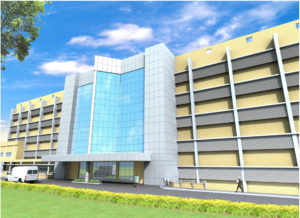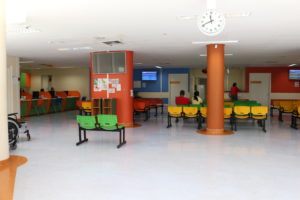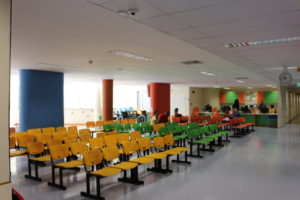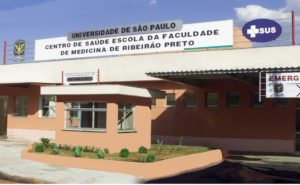The Medical School relies on several research laboratories equipped with cutting-edge technologies. Recently, the FMRP-USP established the Multi-user Equipment and Services Center of the Ribeirão Preto Medical School, with equipment and services including Images and Microscopes, Flow Cytometers, Protein Chemistry, DNA Extraction, Sequencing, and Amplification, among others.
The main objective is to provide technical support to researchers in activities in academia and the private sector, who need equipment and services for research projects. More details on the equipment park, operation, and use are available on the website: https://uspmulti.prp.usp.br/
Thus, for this chapter, we will present the research laboratories in operation that are under the coordination of the permanent professors of the PPGNM. We emphasize that the equipment parks are available at the Multi-user Equipment and Services Center (EMUs) of the Ribeirão Preto Medical School at USP. Also, for professors who do not directly coordinate any laboratory, this same structure will be shared with all professors, respecting the individuality of the lines and research projects.
RESEARCH LABORATORIESCoordinator: Prof. Dr. Alceu Afonso Jordão Júnior Area of approximately 400 m2, distributed in ten rooms for animal accommodation, experimentation, storage of samples and biological materials, in addition to rooms for meetings or practical classes. It houses rats, rabbits, and mice genetically modified or not, serving as a specialized facility in animal experimentation. The animal research facility also provides support for undergraduate teaching in disciplines that use animal models (e.g. Experimental Nutrition) and also for graduate education offering training for students who will use animal models in their research projects.
Coordinator: Prof. Dr. Alceu Afonso Jordão Júnior Collaborator: Paula Garcia Chiarello With an area of approximately 20 m2, the Multidisciplinary Laboratory of Nutrition and Metabolism at FMRP/USP was founded to act as a research center to meet the demands of professors and students who work on related issues, especially in the area of Free Radicals, Antioxidants, and Oxidative Stress, in addition to being structured to carry out the most traditional biochemical techniques involving spectrophotometry in UV/Vis and Fluorescence. Thus, its main equipment is Spectramax M5 for fluorimetric and spectrophotometric determination and Elisa, refrigerated centrifuge, water bath, vortex shaker, and tissue homogenizer. As a routine, it performs Ghrelin, Leptin, 8-OHDG determinations by ELISA. Antioxidant Capacity of Plasma-ABTS, Antioxidant Capacity of Plasma-FRAP, Total Phenolics, Ferritin, Reduced Glutathione, Total Fat, Hemoglobin, Lipid Hydroperoxide, Homocysteine, Malondialdehyde, C-reactive Protein, Carbonylated Proteins, S- S-Adenosyl Methionine/S-Adenosyl Homocysteine Ratio, Thiobarbituric Acid Reactive Substances (TBARS), Homocysteine, and Superoxide Dismutase.
Coordinator: Prof. Dr. Selma Freire de Carvalho da Cunha The laboratory relies on four rooms in an area of 80 m2. It is prepared for dosages of Vitamins A, E, C, and D, Biochemical: Cholesterol, Triglycerides, Glycemia, and Hemoglobin, Antioxidants: SOD, GPx, MDA, and 8-Isoprostane, Studies of gene expression (RNA), Polymorphisms (DNA), Quantification and analysis of protein expression. It is equipped with: NanoDrop 2000 with laptop, MasterCycler Gradient, Biophotometer plus, Image Digitizer, Real Time 7500 for PCR with computer and UPS, ETTAN IPGHOR 3: Isoelectric Focusing Unit, Semi-Dry Transfer System, Elisa Reader and Washer, 2D Protein Scanner, Western Blot-vacuum electrophoresis and transfer, 2 HPLC Shymadzu: UV/VIS detector (SPD-20A), Fluorescence (RF-10 XL), Column oven (CTO-20), Pump (LC-20AT), Integrator, Milli-Q Rios Water System/Distiller, and 30 L Reservoir, DU-640 spectrophotometer with temperature control, Sterilization and Drying Oven, Ice Machine, Gel Vessels for Acrylamide and Agarose , Microwave, Laminar Flow Cabinet, Chemical Fume Hood, Eppendorf Centrifuge, Sorvall Legend Mach 1.6 R Centrifuge, Sigma 2-16PK Refrigerated Centrifuge, 3 Refrigerators, 5 Freezers, one -80°C, Vertical Autoclave AV-75 Phoenix, Water Bath: Boiling/Dry and 37 °C, Sonicator, 3 Precision Scales, pHmeter, 2 Vortex, Tissue Macerator, Agitator and Magnetic Heater, 8 Computers, 5 Printers, 1 Laptop, 5 UPS. A trained laboratory specialist is available to perform the above dosages.
Coordinator: Prof. Dr. Carla Barbosa Nonino Approximate area of 16 m2. The laboratory is equipped with a refrigerated centrifuge, Freezer -80 °C, vortex, scale, water bath, fume hood, equipment for microarray analysis. As a routine, the laboratory performs nucleic acid extractions (DNA and RNA), analysis of genetic polymorphisms (by Real-Time PCR), gene expression and microarrays (for large-scale analysis of transcripts).
Coordinator: Prof. Dr. Maria Cristina Foss-Freitas
Approximate area of 60 m2. This laboratory is equipped with -20 and -70 °C freezers, refrigerators, centrifuges with and without refrigeration, water purification system, vertical and horizontal tanks for electrophoresis, electrophoresis sources, transfer apparatus for western-blot, culture room with laminar flow, ovens, and inverted microscope, ELISA reader, microscope with image capture system, thermal cycler for PCR and real-time PCR device.
Currently, it is standard in the laboratory’s routine to carry out the culture of primary cells and cell lines, ELISA, extraction of DNA, RNA, and protein from biological material to perform western-blot and real-time PCR.
Coordinator: Prof. Dr. Maria Cristina Foss-Freitas Approximate area of 60 m2. The laboratory is equipped with -20 °C and -70 °C freezers, centrifuge, ice machine, gamma and beta radiation reader (for radioimmunoassay), high-performance liquid chromatography apparatus (for glycated Hb dosage), and Immulite apparatus (for PTH dosage). The performance of PTH, Insulin, glycemia in functional tests (GTT and ITT), glycated hemoglobin, and ionic calcium is routinely standardized.
Coordination: Prof. Dr. Anderson Marliere Navarro Approximate area of 20 m2. Equipped with IMMULITE®, Spectrophotometer, Atomic Absorption, -80 °C Freezer, refrigerator, precision scale, water bath, vortex, computers, and printer, in addition to a minimum infrastructure suitable for its operation. It is prepared for the determination of hormones, tumor markers, cytokines, chemokines, folic acid, vitamin B12, biochemical markers of nutritional status, and minerals.
Coordinator: Prof. Dr. Alceu Afonso Jordão Júnior With an approximate area of 40 m2, it is equipped with High-Efficiency Liquid Chromatograph (HPLC), HPLC with UV/Vis detector (YoungLin), HPLC with UV/Vis detector and automated sampler (Shimadzu), Gas Chromatography, Refrigerated Centrifuge, water bath, Vortex shakers, Tissue homogenizer. In this laboratory, the following techniques are performed: Beta-carotene, Vitamin A, Vitamin E, Vitamin C, and amino acids by HPLC, in addition to fatty acids and lipids by Gas Chromatography.
Coordinator: Prof. Dr. Eduardo Ferrioli e Prof. Dr. Júlio Sérgio Marchini Collaborator: Julio Cesar Moriguti With an approximate area of 120 m2, it is equipped with a gas chromatograph (GC) and HPLC (Shimadzu), mass spectrometer (Europa Scientific), and mass spectrometer coupled to GC (Shimadzu), in addition to drying oven, Freezers -70 °C, Ultrasound, refrigerated centrifuge, Speed vac and Freeze dryer. As a routine, the laboratory performs the determination of amino acids, protein markers, bioactive compounds, as well as the determination of energy metabolism and body composition by stable isotopes.
Coordinator: Prof. Dr. Francisco José Albuquerque de Paula The laboratories have an estimated area of 120 m2. They are equipped with Liaison automatic chemiluminescence analyzer, Densitometer (Hologic Discovery), a refrigerated centrifuge, bone histomorphometry analysis system, in addition to a -80 °C freezer. These laboratories routinely perform dosage of 25-hydroxyvitamin D, bioactive PTH, bone alkaline phosphatase, and bone densitometry and body composition by Dual Energy X-Ray (DXA).
Coordinator: Prof.Dr. Rosa Wanda Diez-Garcia Collaborator: Rosane Pilot Pessa e Camila Cremonezi Japur The laboratory is prepared to develop studies that make an interface between the social and human sciences and the biological ones, seeking, both in the worked theme and in the development of methods, the bio-socio-cultural interrelations of food and nutritional phenomena.
The Practice also has a training role of human resources, as it works as a discussion and study group, precisely aiming to improve theoretically and methodologically the issues worked in our lines of research, using qualitative and quantitative research and mixed methods, as well as developing study designs and tools that allow accessing both objective and subjective aspects of eating practices and behavior.
Coordinator: Prof. Dr. Nereida Kilza da Costa Lima It has an approximate area of 20 m2. It is equipped with professional treadmills (Athletic), three Blood Pressure Monitoring device (Spacelabs), four Home Blood Pressure Measurement device (Omron). It is currently standardized for training with aerobic exercises from several research protocols, and training protocols with endurance exercises performed in another area.
Coordinator: Prof. Dr. Vivian Marques Miguel Suen Approximate area of 100 m 2 . The laboratory is equipped with an Ultraviolet Transilluminator, oven for Bacteriological Culture measuring 50X50X60 cm, tube shaker for 40 mm tubes, erlenmeyer, 800-liter refrigerator, Precision pipette, 340-liter refrigerator (2 units), 230-liter vertical freezer, tube shaker (2 units), liquid chromatography, ultrasonic cleaning machine, water bath, 270-liter upright freezer, vertical cooler, magnetic stirrer with heating, 110/220V vacuum pump. We routinely perform in the Lab dosages of vitamin A, vitamin E, and homocysteine.
We also highlight in this section other facilities and support areas, such as practical clinical teaching laboratories (outpatient and clinical health services linked to the area of Nutrition and Metabolism). We emphasize that in these scenarios we have undergraduate, graduate, specialists, and residents according to the needs and capacity of each clinic.
We highlight below the linked scenarios and with the coordination and responsibility of the PPGNM professors.
OTHER FACILITIES AND SUPPORT AREASSpecialized nutrition clinics Uremic Syndrome Nutrition Outpatient Clinic; Oncology Nutrition Outpatient Clinic; Liver Tumor Nutrition Clinic; Outpatient Nutrition in Metabolic liver diseases. Faculty with ongoing projects: Prof. Dr. Paula Garcia Chiarello Outpatient Nutrition in Infectious Diseases (HIV-Seropositive Patients with Lipodystrophy). Faculty with ongoing projects: Prof. Dr. Anderson Marliere Navarro Outpatient Nutrition in Gynecological Endocrinology Faculty with ongoing projects: Prof. Dr. Rosa Wanda Diez Garcia Outpatient Nutrition in Bariatric Surgery; Nutritional Care of the Bariatric Surgery Center, Care service for patients with obesity undergoing surgical treatment. Faculty with ongoing projects: Prof. Dr. Carla Barbosa Nonino High Dependence Geriatrics Outpatient Clinic; General Geriatrics Outpatient Clinic; Outpatient Screening and Short Returns in Geriatrics; Gerontology Outpatient Clinic (GEO); GEDEM Geriatrics and Dementias outpatient clinic. Faculty with ongoing projects: Prof. Dr. Eduardo Ferrioli, Prof. Dr. Júlio Morigutti, and Prof. Dr. Nereida Kilza da Costa Lima. Nutrology clinic; Home Enteral Nutrition Support Outpatient Clinic. Faculty with ongoing projects: Prof. Dr. Selma Freire de Carvalho da Cunha. GRATA – Eating Disorders Assistance Group (Grata) Faculty with ongoing projects to: Prof. Dr. Rosane Pilot Pessa Ribeiro.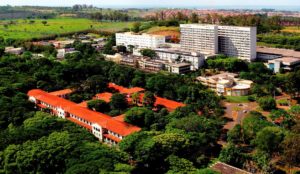
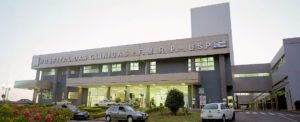
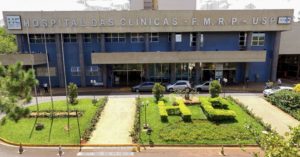
Integral assistance service to women in the Center for Teaching, Research, and Assistance in Rehabilitation of Mastectomized Women. Faculty with ongoing projects: Prof. Dr. Alceu Afonso Jordão Júnior

